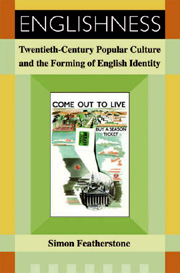1 - Thinking about England
Published online by Cambridge University Press: 12 September 2012
Summary
‘There is no available formula for a post-British England’, writes Tom Nairn, looking ahead to the day when the English, shorn of the high political disguises of Great Britain and the United Kingdom, will have to deal with themselves as a nation rather than as an undeclared senior partner in a quasi-feudal multinational arrangement (Nairn 2000: 28). However, one of the enduring strengths of the English state has always been its avoidance of classic modes of nationalist description, representation and symbolism. Its resistance to definition and particularly its willingness to subsume national identity within the geopolitical organisations that it silently dominated – Great Britain, the Empire, the United Kingdom – produced a resilient, contradictory anti-nationhood, the very denial of nationalism allowing strategic assertions of national power. But whilst the English, in popular political terms, remain a nation that has not spoken yet there has always been a lot of talk about that not speaking. As Nairn suggests, England lacks a popular nationalist politics, but that lack has itself generated distinctive formulas of national representation and debate. This chapter examines five ways of thinking about England involving elegy, empiricism, anti-intellectualism, gender and race that have influenced the representation of nationhood in the twentieth century. They continue to shape contemporary debates, popular and academic, about what it is to be English.
Declining England
English nationalism, pure English nationalism, is difficult to find, such has been the encroachment of Britain upon the politics of England. Even the two political parties most virulent in their nationalist agendas, the British National Party and the UK Independence Party, adopt the disguises of Britain and the United Kingdom in their titles despite being active only in England.
- Type
- Chapter
- Information
- EnglishnessTwentieth-Century Popular Culture and the Forming of English Identity, pp. 9 - 27Publisher: Edinburgh University PressPrint publication year: 2008

